#read the whole thing
Text
The reproductive function of a woman is the only innate function which distinguishes women from men. It is the critical distinction upon which all inequities toward women are grounded. It is, therefore, crucial for women to understand clearly what the nature of this function is, how it is to be defined, and in what relationship the reproductive function stands to a woman.
The reproductive function is a special ability, capacity, or talent held by women. This function is a property which determines their womanhood. The distinction between this function and the usual sense of property is that the latter is static, or primarily spatial, while the former is operational, or exists over time. The reproductive function has the status of property because of its definitive nature.
. . .
The Constitution of the United States, in the Fourteenth Amendment, clearly protects the life, liberty, and property of every person. Any legislation interfering in any way with any woman's self-determination of her reproductive process is clearly unconstitutional. It would interfere with her life by interfering with her person; it would interfere with her liberty by interfering with her freedom of choice as regards her own person; it would interfere with her property since her reproductive process constitutes, in the most integral and strictest sense, her property.
-Ti-Grace Atkinson, Amazon Odyssey
#ti-grace Atkinson#abortion#pregnancy#amerika#radical feminist theory#read the whole thing#usa is a failed state
59 notes
·
View notes
Text
A young man’s lament
Death, a concept seldom spoken of and almost always presented in a negative light; is an abstraction that I have been recently consumed by. Those of us who know the struggles of mental health(almost all of us)know that sometimes death may seem like the answer, and I am here to tell you… that it is.
It is now known that the way concepts are framed in their teaching are at the very least, just as important as the logistics behind the concepts themselves. And death has been presented to us in a way that is innately definite and almost purely physical. “To die is to be gone”. But In my hyper focus and borderline neurotic obsession on the topic I have discovered that this is only one way to look at death and rarely applies to the situation at hand.
Following this thought process I began to question why humans feel the need sometimes to die, logistically this makes no sense, there is no reason biologically for this need to exist, so why do we do it? It’s because inherently; death is a necessary aspect of life, but not in the physical sense that we have been taught, but rather in the mental and emotional sense.
The paradoxical nature of in the genesis of life you are simultaneously rushing headlong into death is beautiful, much like the relationship between light and dark one cannot exist without the other and this fact is the basis of my thought process.
True life/self actualization cannot exist without the death of previous aspects or sometimes, entire versions of ourselves. You don’t want to die… you want the you that’s causing you pain now to die, and that’s okay. and in my opinion necessary. So I say to you…allow this. Parts of you must die so that the new parts of you can grow and flourish, there’s simply not enough room emotionally for every single part of you that has ever existed to live, the pruning of dead or dying traits is a must.
Luckily for us the emotional plasticity found in humans is unlike any other being in this universe, meaning that even if 99% of the person that you are now died that 1% would grow into something beautiful. So trust this process, embrace death with open arms, love it as you should love yourself, knowing that without it you would not truthfully be able to live.
~with love crowned_cr0ws :)
66 notes
·
View notes
Text
Patriarchy means that no amount of bad credit, bad reputation, bad work ethic, bad behavior or bad vibes can truly get in this guy’s way. It means that all sorts of people — including mothers and girlfriends and sisters — have enabled him, in ways subtle and significant. That’s the thing about dominant world orders: they enlist the very people they subjugate to maintain them. Sometimes that enlistment is sneaky or manipulative; other times people (like, say, white women!) understand that a repressive system is still one that ultimately benefits them. But that’s what I like about this filter: it’s not just pointing out a Type of Guy. It’s very softly underlining the role all of us, regardless of gender, play in his survival.
-- Anne Helen Petersen, The Specific Catharsis of 'That Guy"
7 notes
·
View notes
Text
IMPORTANT ANNOUNCEMENT.
This will be regarding the future of the PFK series. Please read EVERYTHING it is very important.
I've been doing a lot of thinking lately about the direction of the series and being a better writer and such and I've realized that- I really dislike Headless Hummingbirds.
I think it's sort of well-known within y'all by now that it was originally a joke. A silly joke for my friends- and it somehow blossomed into this big idea and story that I want to tell through my writing, but because Headless Hummingbirds was originally a joke- and ultimately, that time the group was changing far more than right now, it causes a lot of plot points and characters to be rushed and messed up and it was just all a mess to write.
That plus the fact I never put any real effort into this to being with all led to a product yes, but a product I could have improved. At the time I kept holding myself to deadlines and I forced myself to publish the absolute moment I could, I never through of re-writing and despised the idea of writing a draft so I just published what I had and called it a day.
That was back in September, five months ago- and a girl can change in those months.
Since I've published the book I looked more into actually learning how to write better- because nobody, no matter what you wish; can make a career on pure talent alone. You gotta actually take time to learn stuff- so that I did!
And that learning made me realize that I really dislike the book and I don't want to continue the series with a book starting it off like that. I want this to be good and entertaining- I want this to tell the story right. And what I've made currently is nowhere near how I want to tell the story.
I won't get into nitty, gritty details of what I dislike and what I think is wrong- because I don't want anybody's pity. I just want patience and understanding.
I have decided to re-write Headless Hummingbirds.
So book two will be paused- and actually the few pages of it I already have are going to be deleted. I now know what I want to do with this series unlike before- and I'd like to start with a book in this series that I wrote keeping that in mind. I want to start with a book I put effort in, that I knew was something big I wanted, not a silly joke that I accidentally blew up.
The original idea for Headless Hummingbirds was supposed to be a big, fat, joke. It was supposed to be 50 pages of fun nonsense for us to laugh at- I was actually planning to start writing a different book at the time, but then as I wrote I kept needing more and more pages and adding more and more and eventually- you got Headless Hummingbirds.
But that Headless Hummingbirds can be improved- it can be better and I want it to be. I want to give you guys quality that you'll actually enjoy reading- not something you'll just tolerate for the sake of getting to see what happens to the main gooberish cast.
Now I will say, a re-write does come with some complications that you may or may not like- but I know this is the best decision for my series. I know what I want- and I want to deliver it to you guys in a way that had heart and soul poured into it instead of overused metaphors and brainless ideas.
What does this mean for the audiobook?
This means not that much for the audiobook project actually.
If you don't know, I'm producing a voice-acted audiobook for Headless Hummingbirds- because I'm really extra like that.
In all seriousness, you don't have to worry. The audiobook will still come out- and it won't be paused either! Now it will still take a long while to be published- probably taking till next September or November to release because of re-casting issues and VA's quitting, but the re-write has not effected it at all.
It just means we'll have two Headless Hummingbirds audiobooks!
Speaking of...
What does this mean for the old Headless Hummingbirds book?
Again, it doesn't mean too much- it just means that everything that book says it no longer canon!
As you might have griped- not too long ago I updated saying that the book was the "prologue" to the series, to try and make it seem like a faraway distant to the better books of the franchise I was going to write- but it still didn't feel right.
Now I will still keep it up on the blog! Because it's still a part of the series and should still get it's spot! Though it will be listed as the "Beta Draft," acting sort of as those concept art releases shows will have! This is what we thought of before compared to what you got!
Honestly, that is what it is- I got all the ideas out onto paper- now it just needs re-working and an uncluttered brain to organize them into a proper story- and honestly, I think it's very cool and interesting to look at concept ideas for shows and games- so why shouldn't books have that same thing? Why shouldn't I share the concept and the splatter of messily conceived ideas that brought you the real product?
So don't worry, the book will still be up- it just won't be canon anymore. I know a lot of you probably really liked the original and won't like the fact some of it will have changed, but trust me. The story will be almost identical to the new one I'm writing- just a few character, relationship, setting and event changes is all.
And hey! Who knows, I might make it a thing I do! Share the concept manuscript for the actual installment so you can see where the glory you read came from!
What does this mean for the blog?
Does this mean a restart?
Does this mean a deletion?
Does this make every single post up to this point incorrect?
No
No
And again, no.
Most of the posts I already said aren't canonical don't canonize anything specific I plan on changing from Headless Hummingbirds.
This also does not mean the blog is going to be stopped.
Yes, I have been cheating you out of incorrect quote content- but that due to something entirely different.
Something called school.
(And Hazbin Hotel but I digres.)
But the blog will run smoothly and most everything of recent is 100% canon if I didn't already say it wasn't canon!
In conclusion
I hope you guys wait and stick around to see the re-write of Headless Hummingbirds. I really do, I want to start the series with a book that I wrote knowing what I wanted our of it. I'm a terrible pantser and that is very noticeable in my writing- so this would help me make everything better for you guys! I really want you guys to love this series and I'm going to try my best and write you quality, entertaining things for you to enjoy later down the line!
Thank you for reading
And thank you for your patience :)
I cannot wait to get you the actual HH book!
#writer announcement#announcement#important#importance#this is important#read the whole thing#pitchfork kids#pitchfork kids announcement#important announcement#writer update#update#book update#important update#writer#writer things#author speaks#creative writing#book re-write#story start over
5 notes
·
View notes
Link
What did the sensitivity readers say? And did I care? Of all the aspects of the recent attempt to cancel my work, the one that seems to fascinate most people is the moment when my publishers sent my Orwell Prize-winning memoir, Some Kids I Taught and What They Taught Me, to be assessed by experts who would detect and reform its problematic racism and ableism.
Of course I cared. I’m horrified that people found prejudice and cruelty in my book. And I went into the process willingly: I’ve always enjoyed and benefited from editing and saw this as an extension. I did an initial rewrite — there were many things I was eager to change — in the autumn of 2021 and sent it off full of interest and optimism. I received the reports on it before Christmas. They were never formally used and I share the content here — anonymously, of course — because sensitivity reads are being used more and more widely, and mine gives a valuable insight into how they might work with non-fiction and memoir.
There are several reports — Picador did a thorough job — and they are varied. The novelty of the whole field is reflected in the fact that the Readers use different titles — sensitivity and authenticity — and different methods, too. Some write A4 reports, others use the comment button on Microsoft Word or an Excel sheet, still another presents a simple list of headings, done very possibly with a word search. More than one grades infractions, 1-3. They have of course special areas of expertise — Islam, blackness, disability — but these emerge through inference, not announcement.
…
Given this diversity, it seems reasonable to start with areas of agreement. These mostly occur in the first part of my book, which is set in the Nineties. Perhaps this is because all of the Readers seem to be experts on sexuality and gender, and resisting homophobia is one of my themes. There is even a particular passage, the only one in the book, on which the whole Reader crowd comments and concurs.
The setting is London, 1992. After end-of-term drinks, a favourite student, Liam, comes out to me and then asks me to take him to G.A.Y — because, he says, no one else in his world would know where it was. I was very worried about doing this at the time; even though Liam had just left school, I still felt like his teacher, and I worry even more now, when teachers no longer take 18-year-olds to the pub and are much more aware of influence and consent.
None of these sensitive issues, though — raised at length in the book — worry the Readers. They are concerned, rather, that I might be boasting about helping a young gay person: “Straight white saviour trope”, suggests Wordsearch List, “could be problematic”. And they set up a chorus about what I feel and say after Liam hits the dance floor and I note:
… a new kind of pain, a physical, chesty anxiety that I was not to experience again until I watched my own children walk along ledges or cross a busy road. What would happen to Liam among all those strong bodies? What would happen to his body? He was too young to understand you only got one. Fortunately, it was only twenty minutes or so before he came back out of the crowd and grasped his beer.
‘Liam,’ I said, ‘I love you. You have to promise me to always use a condom and never get AIDS.’
I make, my Readers agree, a “reductive” and “rogue” remark. The preceding passage “comes across as homophobic” and is an LGBTQ infraction Level 2. But in 1992, people were still dying in large numbers from AIDS, and I would have urged all young people to use condoms. Excel Reader is kind enough to acknowledge this — “the author has chosen to reproduce contemporary dialogue which may not … reflect brilliantly on her” — but the other Readers seem to concur that the past should match an idealised present, in the same way that Anne of Green Gables, say, got a gay best friend when she went on Netflix.
There are similar injunctions throughout the text. I am enjoined not to quote from My Ántonia by Willa Cather, as it is “an old novel”; nor to state that homosexuality has historically been taboo in Nepal, as homophobia comes from colonialism; nor to mention that the Taliban were terrorists. Extending the principle of sunny improvement into the present, Wordsearch List breaks out of their list to make the helpful suggestion that I should remove references to terrorism from across the book, as it “over-sensationalises such a heavy topic, especially with minors involved”.
Nor should I say that more middle-class than working-class children go to university; nor that Foetal Alcohol Syndrome leaves children unable to progress; nor that a long tight dress restricts movement. All of these things are, for my Readers, “hurtful” notions of mine, not unfortunate facts. Writing, they imply, should represent the world as it ought to be, not as it is.
Perhaps this is a reflection of the sensitivity read’s origins in children’s and young adult fiction. There are good reasons for regulating children’s reading: it is foundational and formational and may be enforced by school choice or being read aloud to. It is genuinely important, there, to avoid oppressive stereotypes.
But Some Kids isn’t a novel, nor written for children. Adults are able to put books down if they upset them, so their books may safely contain difficult ideas. I don’t, for example, agree with my Readers that the references to looks, attraction and sexuality in my book should be removed in case readers are hurt by a metaphor as a child might plausibly be. I think adults can endure bings being compared to boils. I also believe that physical human beauty empirically exists, is enormously important for adolescents, and that I can observe its currency and often destructive power, especially for young women, in the classroom. I make an explicit argument about this, which readers may disagree with.
…
My Readers though, have not been hired as literary people. They are there to help create a book that would play better on Twitter, not one that is better written. For example, they like my liberal conclusions to chapters so they recommend I put them as introductions. I should eliminate journeys of thought across chapters, ambiguity from paragraphs, and nuance from sentences. Love, they assure me, is never expressed with shadows.
I struggle with all this. I baulk, besides, perhaps snobbishly, at their language: the imprecision of phrases such as “feels like the kind of saying that could be deemed insensitive these days”, or “white knight tone/verve” (verve?). I snarl when Excel helpfully suggests I have made a typo with e. e. cummings, and lost his capital letters. It upsets me in particular, when so many of their criticisms depend on it, that none of the Readers deploy the word “irony”, but use “sarcasm”, “jocular aside” and “subtlety” instead, always as negatives. Comment Button condemns my entire chapter on Prizes as “it shows none of the adults involved in a good light”. Indeed it doesn’t. They are being satirised, even though one of them was me.
…
Times change. In 1997, a second edition of my first poetry collection, Slattern, was published with Picador. I was thrilled, and immediately took a copy to show off at a festival in St Andrews. Two poems into reading from it, though, I was startled to discover the words had been changed.
A copy editor had decided my irony, commas, and word-choices were too eccentric, and had taken it upon himself to alter them in several poems. I emailed Picador, and the next morning found myself speaking (on a pay phone) to the legendary Peter Straus, Picador’s Publisher. He noted down each tiny adjustment himself and explained he would be ordering the pulping of the books, the carpeting of the copy editor and the printing of a new edition. He wouldn’t be thanked. He seemed to think this was Picador’s mission: to preserve, within its profit-making superstructure, a space for the miniature nuances of a poet.
A quarter of a century later, publishing had moved on. Philip Gwyn Jones, the new holder of Peter Straus’s position, tweeted: “I now understand I must use my privileged position as a white middle-class gatekeeper with more awareness to promote diversity, equity, inclusivity, as all UK publishing strives to put right decades of structural inequality”. At the same time, one of the sensitivity reads Picador had commissioned was advising that Some Kids “exemplifies why publishing is so unwelcoming to marginalised people”. The Readers were explicit that this was not to do with any actual words on the page, but because they could tell that I personally had not done “the self-reflection and self-education that is necessary to understand the underlying reason that so many people felt harmed by [my] work”. They recommended the book should not be republished.
Before we could discuss this, Picador and I agreed to split. After the announcement was made, Swift Press offered to take on the book. I thought carefully about all the notes I had been given and, in the end, adopted none of the suggestions proffered by the Readers. The Kindle edition of Some Kids I Taught and What They Taught Me now on sale with Swift is the same one I originally sent to the sensitivity readers for report, and if you want to know more about what caused such deep offence, and seems to exemplify so much about publishing, I suggest you read it.
84 notes
·
View notes
Text
In order to define gender dysphoria, [the DSM-5] assumes that a person can have a gender experience that does not match their sex characteristics. . . . admire the circular nature of the whole thing: “gender does not always match sex,” they say. How do they know? “Because in some people, gender does not match sex.” What would get an “F” in logic, gets an “A” in psychology.
Also, notice the phrase “anticipated secondary sex characteristics.” Those are characteristics that develop during or after puberty. With this phrase, the DSM—and by extension the whole transgender movement—reveals its real motive. The target audience of this is not some 25-year-old gender-studies dude who feels like a girl, but pre-pubescent kids.
The DSM is written to convince schools, counselors, teachers, and social workers to get pre-pubescent kids to question if their “gender experience” matches their “anticipated sex characteristics.”
. . .
The transgender movement has become the gravitational center of our culture. It is fed by the Bible of psychology, and it targets our kids. We should at least be familiar with the book that is being used to justify the massive surge in the transgender movement.
Parents: Teach your kids Genesis 5:1-2. Tell them that God made them and God loves them, even when they don’t love themselves. Understand that many leaders, doctors, and educators are committed to getting them to hate their bodies and themselves, which is in stark contrast with the God of the Bible, who loves them, cares for them, and designed them. The love of God is greater than the harm of the DSM-5-TR.
8 notes
·
View notes
Text
I am in love with The Rolling Stone review of the Teen Wolf Movie.


...

8 notes
·
View notes
Text
Come to the Nightside! We have:
Ms. Fate, the drag queen super hero!
John Taylor, the poster boy for British edge lord Gaty Stus!
Susie Shooter, aka Shotgun Susie, aka "Oh God, it's her, run!"
Razor Eddie, Punk God of the Straight Razor, whose B.O. kills flies!
Dead Boy! (please don't ask for details)
Literal man-made horrors beyond your comprehension!
Arson! Just, like, a LOT of arson!
Not to mention the most exclusive clubs in the multiverse, any and every kind of sex with any and every kind of being (and inanimate object), a really rather distressing amount of murder, and more money than God!
(Brought to you by The Nightside Tourism Board. Good luck finding the place.)
10 notes
·
View notes
Text
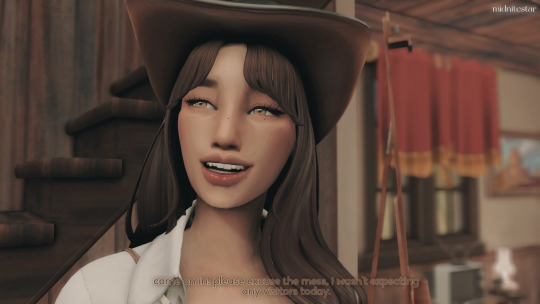
a welcome wagon and a makeshift date.
⸻ the fixer upper ranch challenge: chapter 5
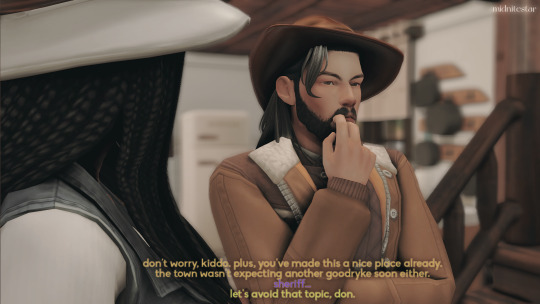

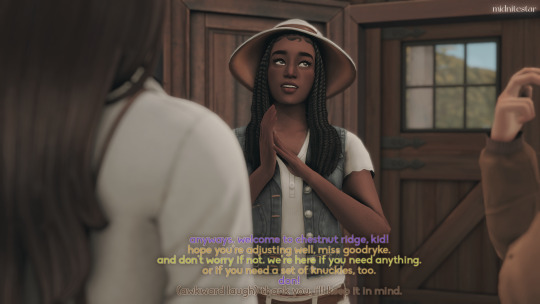
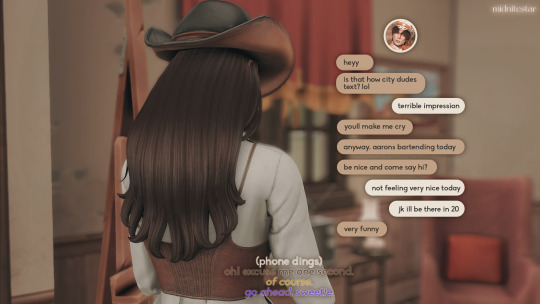
introducing the town's sheriff, don gooseman; the renowned horse racing champion, sienna grove; and girl-next-door, autumn.





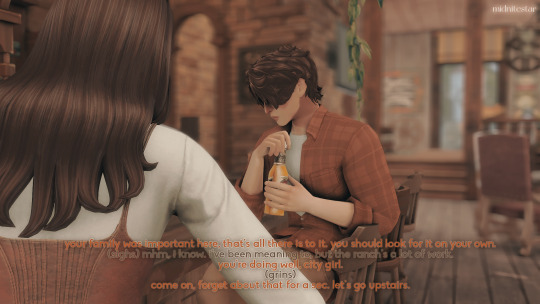
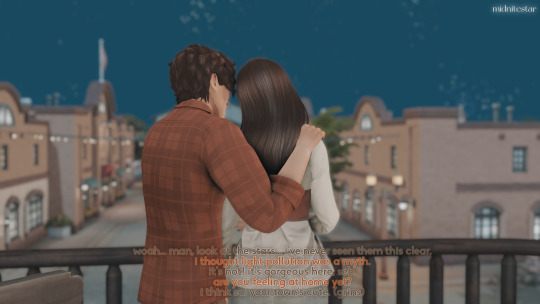
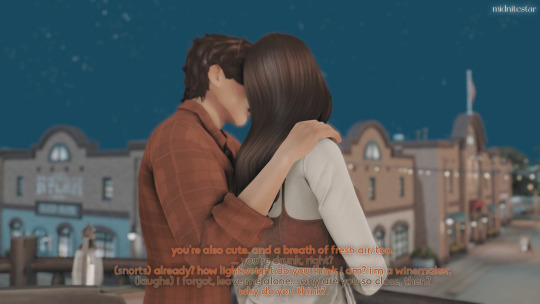

read from the beginning here!
#READ THE WHOLE THING#THEY FINALLY DID IT#my sillies#*paige goodryke#*seb goodwin#fixer upper ranch challenge#the sims 4#ts4 simblr#ts4 gameplay#ts4 legacy#ts4 screenies#ts4 screenshots#ts4 story
2 notes
·
View notes
Text

14 notes
·
View notes
Text
I… have a confession to make.
I’m homophobic.
Not in the traditional sense though. As in, everyone in the queer community is so cool and awesome and approaching them is terrifying.
#Read the whole thing#not just the second line#It’s supposed to be funny#If it’s not please alert me to the fact and I shall remedy#Random rambles of my unhinged mind#Farewell fellow humans
2 notes
·
View notes
Text
From A Fat Artist
TW: Weight talk, ED talk, Fatphobia, Depressive Mental Illness, Diet Culture
For a TL;DR: a vague but comprehensive insert of my feelings on some art policing in a certain podcast fandom right now
Please read at your own discretion
I suffered from ED for the better half of my life. At 21, I can finally say I have broken a lot of old habits and I’ve been keeping myself pretty stable on my weight. It wasn’t always like this. I used to do pretty much... any diet that my mother was on? Weight watchers, Atkins, South Beach, all of these frequented the household I lived in. I did Keto, Low Carb, Carb Addict especially. My mother deemed I had a problem with how I looked and she pushed that onto me from her own projections since probably junior high.
I had stages of my life where my weight fluctuated by the tens and twenties. I’d rapidly lose 20 pounds of “water weight” during my keto and no carb days within a week or two, only to break my diet from stress and immediately gain 40 in a couple of days. This was the point that I had the lowest self-image. I was broken, I was suffering from constant diet culture. You weren’t allowed to eat past 6 PM, you couldn’t eat a big dinner, no carbs, bread makes you fat, sugars are bad, don’t eat sweets. These mantras sat on my shoulders every day. I feared going to the vending machine in high school to grab a sweet treat that I’d been depriving myself for WEEKS because one wrong look sent my ED mindset into overdrive.
I bring all of this up for a reason, I promise. I’m not torturing you with my ED senselessly.
I lost a LOT of weight during that time. I also gained weight, but mostly I lost a lot of weight. I had people who constantly commented about how good I looked. But I didn’t feel that way. I was malnourished, underfed, I felt like I was wasting away. I was UNHAPPY. But the alternative was to feel uncomfortable in dressing rooms. I had people spreading rumors about my stretch marks, which didn’t help. They were talking about how morbidly obese I was, how ugly and disgusting I looked, how they didn’t want to get close to me because “what if they smell” because they assumed that because I was fat I was unhygienic.
If someone is losing weight, they don’t always have to be happy about it. Take me for example if nobody else. I was ill. I was lonely. I was depressed. I was thinner. While weight loss may be a milestone for some, it’s a sign of issue for others.
Weight loss as a means of showing bad states of mind is very uncommon in media. It’s treated as the best thing to happen to the Ugly Fat Girl in High School, it’s seen as the Only Way To Get Girls if you’re a straight guy. Weight GAIN is seen as even worse, when Regina gains weight in Mean Girls, it’s seen as terrible. Now obviously that’s more nuanced, but it’s still an issue. Let people indulge in what they want. Gaining weight is not bad.
I’m not criticizing old media, though, for outdated views. I’m criticizing people NOW. Someone drawing weight loss on a fat character is Not The End Of The World. ESPECIALLY if this is during a turbulent and low point in a character’s life. Obviously, there can be disagreement, some people can see it differently, but overall, that’s up to the creative choice in the artist. Not only that, but it can be a source of projection for someone. I constantly project onto characters because of how I feel or how something affects me. It’s a form of therapeutic escapism and relief. Do I think that’s canon? Probably not. But does it make me feel better? Absolutely. Seeing someone in media share what I feel can provide a sense of comfort to me. A sense of belonging.
When someone projects onto a character in a way you don’t like, it is not an excuse for you to call them a bigot in some way. That is their personal feelings. Especially if the people who actually are “to be affected” by it don’t agree with you, just. Move on.
As a fat artist, if I see someone drawing a fat character losing weight as a result of sickness, or is stated that it’s bad, I’m not going to be bothered by that. Because that’s my own personal viewpoint. But hearing a bunch of non-fat people talk about how “you’re being fatphobic, I’m speaking for fat people” when you don’t know how the fat people actually feel, as well as try to make others feel like shit, ESPECIALLY if you’re trying to gatekeep or police art or fan content in media? That’s more triggering than the art piece itself, and that’s a problem.
#fat person#fat artist#long post#read the trigger warnings#read the whole thing#serious post#please don't @ or put names in it#i kept it vague for a reason#iykyk
10 notes
·
View notes
Text
my most prized possessions in the whole wide internet i have because i wrote an email to a pony figurine photo blog saying i really liked their stuff, and they wrote me back and sent me pics
#mine#run by two sisters who've been keeping the world running since they were little kids. its sweet. i had a bad night a few months ago and#read the whole thing
12 notes
·
View notes
Text
It's about the type of guy he represents. He is not the toxic bro, but he’s friends with him. He supports him. He calls out the nameless, faceless bad guys, but not the ones he’s friends with. Phantoms are easier to fight than buddies, after all. He’s the type of guy who benefits from patriarchy while still being the good guy because he’s not as bad as the rest of them. It’s building a life to look good, without actually doing the radical work of being good. He’s #NotAllMen, the ones who don’t actively do harm, but maybe don’t actively do good, either.
It might be unfair to lash out at these kinds of guys. But in so many ways they create the environment where the others thrive. This type of guy is the cytoplasm of the patriarchy, the fluid that holds it all together.
-- Lyz Lenz, A good man is hard to find
3 notes
·
View notes
Text
Swaying the wide world, I have but one aim in view, namely, to maintain a perfect governance and to fulfil the duties of the State: strange and costly objects do not interest me. If I have commanded that the tribute offerings sent by you, O King, are to be accepted, this was solely in consideration for the spirit which prompted you to dispatch them from afar. Our dynasty's majestic virtue has penetrated unto every country under Heaven, and Kings of all nations have offered their costly tribute by land and sea. As your Ambassador can see for himself, we possess all things. I set no value on objects strange or ingenious, and have no use for your country's manufactures. This then is my answer to your request to appoint a representative at my Court, a request contrary to our dynastic usage, which would only result in inconvenience to yourself. I have expounded my wishes in detail and have commanded your tribute Envoys to leave in peace on their homeward journey. It behoves you, O King, to respect my sentiments and to display even greater devotion and loyalty in future, so that, by perpetual submission to our Throne, you may secure peace and prosperity for your country hereafter. Besides making gifts (of which I enclose an inventory) to each member of your Mission, I confer upon you, O King, valuable presents in excess of the number usually bestowed on such occasions, including silks and curios-a list of which is likewise enclosed. Do you reverently receive them and take note of my tender goodwill towards you! A special mandate.
The Qianlong Emperor, in his 1793 letter to King George III
#quote#china#middle kingdom#son of heaven#qianglong emperor#king george iii#remember that the chinese emperor ruled all of humanity#and all foreign leaders are but his subordinates to whom he has deigned to delegate some small measure of authority#or so the chinese view went#read the whole thing
2 notes
·
View notes
Quote
There are not many on earth who have no religion at all. Yet only a few have a religion that will bear Scripture inspection. Most are content with traditions received from their parents, and can render no valid reason for their hope of Heaven.
J.C. Ryle, “Sickness” [More gems]
7 notes
·
View notes